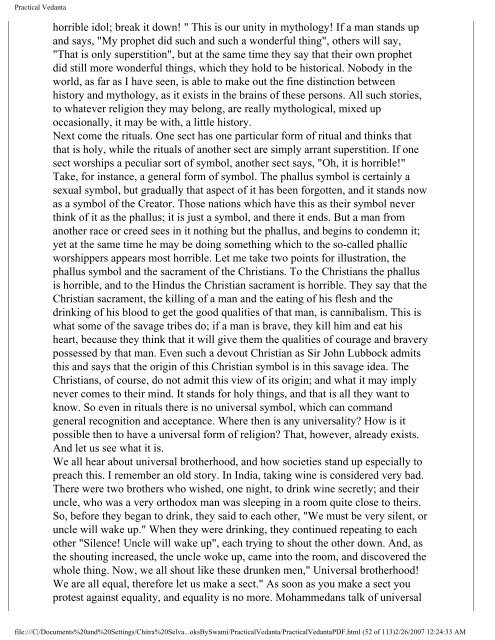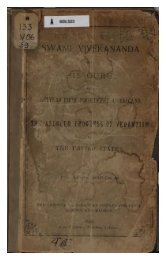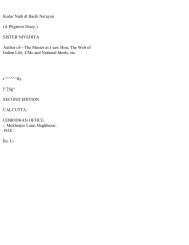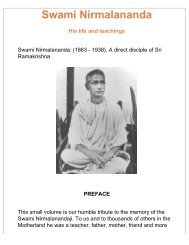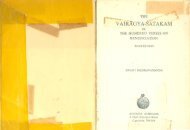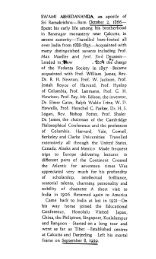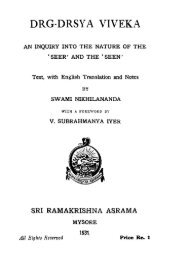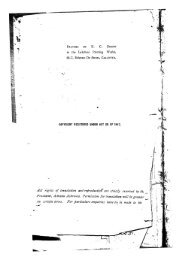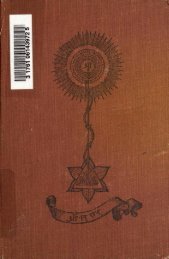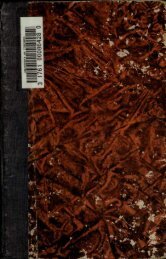<strong>Practical</strong> <strong>Vedanta</strong>horrible idol; break it down! " This is our unity in mythology! If a man stands upand says, "My prophet did such and such a wonderful thing", others will say,"That is only superstition", but at the same time they say that their own prophetdid still more wonderful things, which they hold to be historical. Nobody in theworld, as far as I have seen, is able to make out the fine distinction betweenhistory and mythology, as it exists in the brains of these persons. All such stories,to whatever religion they may belong, are really mythological, mixed upoccasionally, it may be with, a little history.Next come the rituals. One sect has one particular form of ritual and thinks thatthat is holy, while the rituals of another sect are simply arrant superstition. If onesect worships a peculiar sort of symbol, another sect says, "Oh, it is horrible!"Take, for instance, a general form of symbol. The phallus symbol is certainly asexual symbol, but gradually that aspect of it has been forgotten, and it stands nowas a symbol of the Creator. Those nations which have this as their symbol neverthink of it as the phallus; it is just a symbol, and there it ends. But a man fromanother race or creed sees in it nothing but the phallus, and begins to condemn it;yet at the same time he may be doing something which to the so-called phallicworshippers appears most horrible. Let me take two points for illustration, thephallus symbol and the sacrament of the Christians. To the Christians the phallusis horrible, and to the Hindus the Christian sacrament is horrible. They say that theChristian sacrament, the killing of a man and the eating of his flesh and thedrinking of his blood to get the good qualities of that man, is cannibalism. This iswhat some of the savage tribes do; if a man is brave, they kill him and eat hisheart, because they think that it will give them the qualities of courage and braverypossessed by that man. Even such a devout Christian as Sir John Lubbock admitsthis and says that the origin of this Christian symbol is in this savage idea. TheChristians, of course, do not admit this view of its origin; and what it may implynever comes to their mind. It stands for holy things, and that is all they want toknow. So even in rituals there is no universal symbol, which can commandgeneral recognition and acceptance. Where then is any universality? How is itpossible then to have a universal form of religion? That, however, already exists.And let us see what it is.We all hear about universal brotherhood, and how societies stand up especially topreach this. I remember an old story. In India, taking wine is considered very bad.There were two brothers who wished, one night, to drink wine secretly; and theiruncle, who was a very orthodox man was sleeping in a room quite close to theirs.So, before they began to drink, they said to each other, "We must be very silent, oruncle will wake up." When they were drinking, they continued repeating to eachother "Silence! Uncle will wake up", each trying to shout the other down. And, asthe shouting increased, the uncle woke up, came into the room, and discovered thewhole thing. Now, we all shout like these drunken men," Universal brotherhood!We are all equal, therefore let us make a sect." As soon as you make a sect youprotest against equality, and equality is no more. Mohammedans talk of universalfile:///C|/Documents%20and%20Settings/Chitra%20Selva...oksBySwami/<strong>Practical</strong><strong>Vedanta</strong>/<strong>Practical</strong><strong>Vedanta</strong>PDF.html (52 of 113)2/26/2007 12:24:33 AM
<strong>Practical</strong> <strong>Vedanta</strong>brotherhood, but what comes out of that in reality? Why, anybody who is not aMohammedan will not be admitted into the brotherhood; he will more likely havehis throat cut. Christians talk of universal brotherhood; but anyone who is not aChristian must go to that place where he will be eternally barbecued.And so we go on in this world in our search after universal brotherhood andequality. When you hear such talk in the world, I would ask you to be a littlereticent, to take care of yourselves, for, behind all this talk is often the intensestselfishness. "In the winter sometimes a thunder-cloud comes up; it roars and roars,but it does not rain; but in the rainy season the clouds speak not, but deluge theworld with water." So those who are really workers, and really feel at heart theuniversal brotherhood of man, do not talk much, do not make little sects foruniversal brotherhood; but their acts, their movements, their whole life, show outclearly that they in truth possess the feeling of brotherhood for mankind, that theyhave love and sympathy for all. They do not speak, they do and they live. Thisworld is too full of blustering talk. We want a little more earnest work, and lesstalk.So far we see that it is hard to find any universal features in regard to religion, andyet we know that they exist. We are all human beings, but are we all equal?Certainly not. Who says we are equal? Only the lunatic. Are we all equal in ourbrains, in our powers, in our bodies? One man is stronger than another, one manhas more brain power than another. If we are all equal, why is there thisinequality? Who made it? We. Because we have more or less powers, more or lessbrain, more or less physical strength, it must make a difference between us. Yetwe know that the doctrine of equality appeals to our heart. We are all humanbeings; but some are men, and some are women. Here is a black man, there is awhite man; but all are men, all belong to one humanity. Various are our faces; Isee no two alike, yet we are all human beings. Where is this one humanity? I finda man or a woman, either dark or fair; and among all these faces I know that thereis an abstract humanity which is common to all. I may not find it when I try tograsp it, to sense it, and to actualise it, yet I know for certain that it is there. If I amsure of anything, it is of this humanity which is common to us all. It is through thisgeneralised entity that I see you as a man or a woman. So it is with this universalreligion, which runs through all the various religions of the world in the form ofGod; it must and does exist through eternity. "I am the thread that runs through allthese pearls," and each pearl is a religion or even a sect thereof. Such are thedifferent pearls, and the Lord is the thread that runs through all of them; only themajority of mankind are entirely unconscious of it.Unity in variety is the plan of the universe. We are all men, and yet we are alldistinct from one another. As a part of humanity I am one with you, and as Mr. Soand-soI am different from you. As a man you are separate from the woman; as ahuman being you are one with the woman. As a man you are separate from theanimal, but as living beings, man, woman, animal, and plant are all one; and asexistence, you are one with the whole universe. That universal existence is God,file:///C|/Documents%20and%20Settings/Chitra%20Selva...oksBySwami/<strong>Practical</strong><strong>Vedanta</strong>/<strong>Practical</strong><strong>Vedanta</strong>PDF.html (53 of 113)2/26/2007 12:24:33 AM
- Page 1 and 2: Practical VedantaPractical VedantaP
- Page 3 and 4: Practical Vedantaworld. If I am a s
- Page 5 and 6: Practical Vedantadifference is only
- Page 7 and 8: Practical VedantaThe ideal of faith
- Page 9 and 10: Practical Vedantamoment of our live
- Page 11 and 12: Practical Vedantaof the Christs and
- Page 13 and 14: Practical Vedanta"This life is Brah
- Page 15 and 16: Practical Vedantadark fifteen days,
- Page 17 and 18: Practical Vedantalife. This is the
- Page 19 and 20: Practical Vedantaeverything would b
- Page 21 and 22: Practical Vedantait is only through
- Page 23 and 24: Practical Vedantawhich is that subt
- Page 25 and 26: Practical Vedantanoumenon and pheno
- Page 27 and 28: Practical Vedantato which is the be
- Page 29 and 30: Practical VedantaAbsolute.The finit
- Page 31 and 32: Practical Vedantawhich is not the q
- Page 33 and 34: Practical Vedantaexperience that th
- Page 35 and 36: Practical Vedantafulfilled. The Jiv
- Page 37 and 38: Practical Vedantabetween the pure r
- Page 39 and 40: Practical Vedantacome out straight.
- Page 41 and 42: Practical Vedantawar with one anoth
- Page 43 and 44: Practical Vedantanobody could under
- Page 45 and 46: Practical VedantaMy idea, therefore
- Page 47 and 48: Practical Vedantathe same methods.
- Page 49 and 50: Practical Vedantavarious minds, all
- Page 51: Practical Vedantabrotherhood; but t
- Page 55 and 56: Practical Vedantawe all go with ves
- Page 57 and 58: Practical Vedantareason. What can y
- Page 59 and 60: Practical Vedantabeen preached in t
- Page 61 and 62: Practical Vedantathe husband kisses
- Page 63 and 64: Practical Vedantaof the knowledge a
- Page 65 and 66: Practical Vedantafor those who only
- Page 67 and 68: Practical Vedantasun exists because
- Page 69 and 70: Practical Vedantaof death was pleas
- Page 71 and 72: Practical VedantaGod. We must learn
- Page 73 and 74: Practical Vedantaa plague comes, it
- Page 75 and 76: Practical VedantaAtman? "As with a
- Page 77 and 78: Practical Vedantathat immortal One,
- Page 79 and 80: Practical Vedantaand the third egoi
- Page 81 and 82: Practical VedantaWitness of the uni
- Page 83 and 84: Practical VedantaPractical Vedanta1
- Page 85 and 86: Practical Vedantaeternal ; every ot
- Page 87 and 88: Practical Vedantafaculty, Buddhi, w
- Page 89 and 90: Practical VedantaPractical Vedanta1
- Page 91 and 92: Practical Vedantastepping-stone to
- Page 93 and 94: Practical Vedantarecognition? Findi
- Page 95 and 96: Practical Vedantasentient." This is
- Page 97 and 98: Practical Vedantaessentially differ
- Page 99 and 100: Practical Vedantaexistence is limit
- Page 101 and 102: Practical Vedantalive, for I am lif
- Page 103 and 104:
Practical Vedantasee from Kapila's
- Page 105 and 106:
Practical Vedantalimitation, but th
- Page 107 and 108:
Practical Vedantaperfect, infinite,
- Page 109 and 110:
Practical Vedantaindividuality, of
- Page 111 and 112:
Practical Vedantarepeat [something]
- Page 113:
Practical Vedantaperson who dies in


